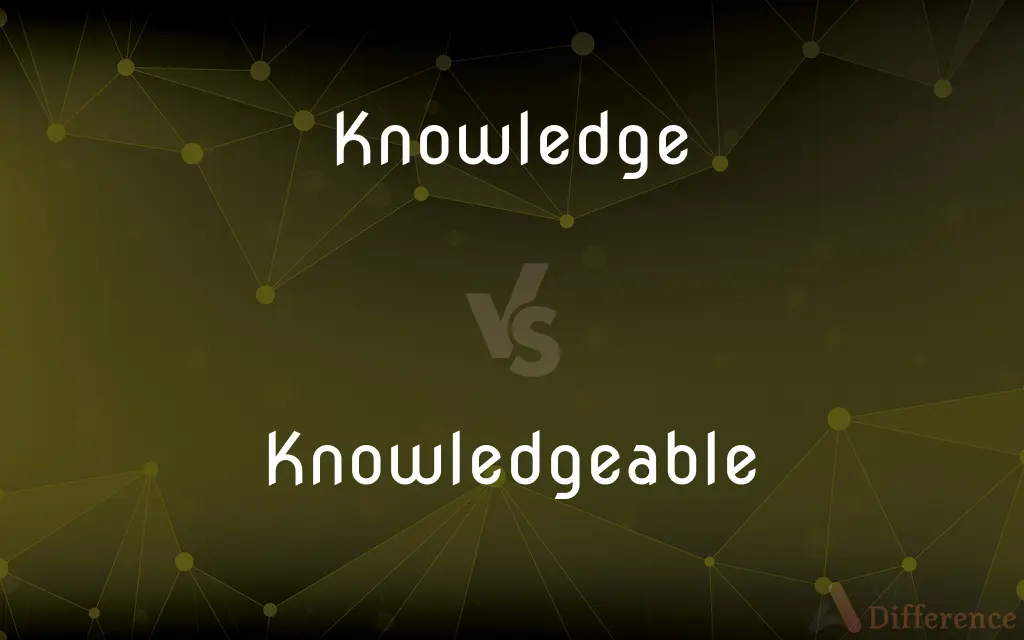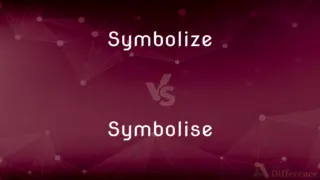Knowledge vs. Knowledgeable — What's the Difference?
Edited by Tayyaba Rehman — By Maham Liaqat — Updated on March 27, 2024
Knowledge is the information, understanding, and skills acquired through experience or education. Being knowledgeable means having a deep understanding of a particular subject or subjects.

Difference Between Knowledge and Knowledgeable
Table of Contents
ADVERTISEMENT
Key Differences
Knowledge encompasses the facts, information, and skills acquired through experience or education. It is the theoretical or practical understanding of a subject. On the other hand, being knowledgeable refers to a person's state of having acquired a lot of knowledge, particularly in one or more specific areas, demonstrating depth and breadth in understanding.
The acquisition of knowledge can occur through various means such as reading, observing, or experiencing, making it a broad concept that applies to both theoretical insights and practical skills. Whereas, being knowledgeable signifies the effective application and demonstration of this acquired knowledge, often being recognized as expertise or proficiency in a particular field.
Knowledge itself is an abstract concept, quantified by the amount and type of information a person or a collective holds. In contrast, being knowledgeable is an attribute of individuals or entities that effectively utilize and communicate their knowledge, showcasing their competence and intelligence in specific areas.
The value of knowledge lies in its potential to inform decisions, inspire innovation, and guide actions. Meanwhile, a knowledgeable person leverages this value, using their understanding and insights to influence, teach, and lead in their respective domains.
Knowledge can be shared and transferred, contributing to the collective intelligence of a community or society. Knowledgeable individuals play a key role in this process, acting as conduits for the dissemination and application of knowledge, thereby enriching the learning and understanding of others.
ADVERTISEMENT
Comparison Chart
Definition
The information, understanding, and skills acquired.
Having or showing understanding or information about a subject.
Nature
Abstract concept encompassing facts and skills.
An attribute or quality of individuals.
Acquisition
Through experience, education, or research.
Through the deep and focused acquisition of knowledge.
Application
Can be theoretical or practical.
Demonstrated through expertise or proficiency in a subject.
Measurement
Quantified by amount and type of information.
Assessed by depth, breadth, and application of knowledge.
Compare with Definitions
Knowledge
Understanding gained from experience.
Practical knowledge can often lead to innovative solutions.
Knowledgeable
Well-informed in a specific field.
She is knowledgeable about sustainable farming practices.
Knowledge
Facts and information acquired through study.
Her knowledge of medieval history is impressive.
Knowledgeable
Effective in communicating knowledge.
Her ability to explain complex concepts shows she's knowledgeable.
Knowledge
Collectively held information.
The knowledge within this library is invaluable.
Knowledgeable
Showing depth of understanding.
His knowledgeable insights on economics are widely respected.
Knowledge
Skills developed over time.
His knowledge of woodworking comes from years of practice.
Knowledgeable
Capable of making informed decisions.
Knowledgeable investors understand the risks and rewards.
Knowledge
Theoretical or practical grasp of a subject.
Her extensive knowledge of biology aids her teaching.
Knowledgeable
Demonstrating expertise or proficiency.
As a knowledgeable historian, he contributes to academic discussions.
Knowledge
Knowledge is a familiarity, awareness, or understanding of someone or something, such as facts (descriptive knowledge), skills (procedural knowledge), or objects (acquaintance knowledge). By most accounts, knowledge can be acquired in many different ways and from many sources, including but not limited to perception, reason, memory, testimony, scientific inquiry, education, and practice.
Knowledgeable
Intelligent and well informed
She is very knowledgeable about livestock and pedigrees
Knowledge
Facts, information, and skills acquired through experience or education; the theoretical or practical understanding of a subject
A thirst for knowledge
Her considerable knowledge of antiques
Knowledgeable
Possessing or showing knowledge or intelligence; perceptive and well-informed.
Knowledge
Awareness or familiarity gained by experience of a fact or situation
The programme had been developed without his knowledge
He denied all knowledge of the incidents
Knowledgeable
Having knowledge, especially of a particular subject.
A knowledgeable man
Knowledge
The state or fact of knowing
Humans naturally aspire to knowledge.
Knowledgeable
Educated and well informed.
Knowledge
Familiarity, awareness, or understanding gained through experience or study
Has great knowledge of these parts.
Has only limited knowledge of chemistry.
Knowledgeable
(India) A person who has knowledge; an informed party.
Knowledge
The sum or range of what has been perceived, discovered, or learned
The extraordinary knowledge housed in the library.
Knowledgeable
Thoroughly acquainted with and skilled in something through study or experience; as, knowledgeable in classical languages. Opposite of unversed, unacquainted, and unfamiliar.
Knowledge
(Archaic) Carnal knowledge.
Knowledgeable
Fully informed.
Knowledge
The fact of knowing about something; general understanding or familiarity with a subject, place, situation etc.
His knowledge of Iceland was limited to what he'd seen on the Travel Channel.
Knowledgeable
Highly educated; having information or understanding.
Knowledge
Awareness of a particular fact or situation; a state of having been informed or made aware of something.
Knowledgeable
Highly educated; having extensive information or understanding;
An enlightened public
Knowing instructors
A knowledgeable critic
A knowledgeable audience
Knowledge
Intellectual understanding; the state of appreciating truth or information.
Knowledge consists in recognizing the difference between good and bad decisions.
Knowledgeable
Thoroughly acquainted with and skilled in something through study or experience;
Well versed in classical languages
Knowledge
Familiarity or understanding of a particular skill, branch of learning etc.
Does your friend have any knowledge of hieroglyphs, perchance?
A secretary should have a good knowledge of shorthand.
Knowledgeable
Alert and fully informed;
Politically aware
A knowing collector of rare books
The most...technically aware of the novelists under thirty
Surprisingly knowledgeable about what was going on
Knowledge
(philosophical) Justified true belief
Knowledgeable
Thoroughly acquainted with through study or experience;
This girl, so intimate with nature
KnowledgeaIble about the technique of painting
Knowledge
(obsolete) Information or intelligence about something; notice.
Knowledge
The total of what is known; all information and products of learning.
His library contained the accumulated knowledge of the Greeks and Romans.
Knowledge
(countable) Something that can be known; a branch of learning; a piece of information; a science.
Knowledge
(obsolete) Acknowledgement.
Knowledge
(obsolete) Notice, awareness.
Knowledge
The deep familiarity with certain routes and places of interest required by taxicab drivers working in London, England.
Knowledge
(obsolete) To confess as true; to acknowledge.
Knowledge
The act or state of knowing; clear perception of fact, truth, or duty; certain apprehension; familiar cognizance; cognition.
Knowledge, which is the highest degree of the speculative faculties, consists in the perception of the truth of affirmative or negative propositions.
Knowledge
That which is or may be known; the object of an act of knowing; a cognition; - chiefly used in the plural.
There is a great difference in the delivery of the mathematics, which are the most abstracted of knowledges.
Knowledges is a term in frequent use by Bacon, and, though now obsolete, should be revived, as without it we are compelled to borrow "cognitions" to express its import.
To use a word of Bacon's, now unfortunately obsolete, we must determine the relative value of knowledges.
Knowledge
That which is gained and preserved by knowing; instruction; acquaintance; enlightenment; learning; scholarship; erudition.
Knowledge puffeth up, but charity edifieth.
Ignorance is the curse of God;Knowledge, the wing wherewith we fly to heaven.
Knowledge
That familiarity which is gained by actual experience; practical skill; as, a knowledge of life.
Shipmen that had knowledge of the sea.
Knowledge
Scope of information; cognizance; notice; as, it has not come to my knowledge.
Why have I found grace in thine eyes, that thou shouldst take knowledge of me?
Knowledge
To acknowledge.
Knowledge
The psychological result of perception and learning and reasoning
Common Curiosities
What does it mean to be knowledgeable?
Being knowledgeable means having a deep and well-rounded understanding of specific subjects, often demonstrated through expertise and effective communication.
Can knowledge be measured?
While it's challenging to measure knowledge quantitatively due to its abstract nature, it can be assessed based on the depth and breadth of understanding a person has.
What is knowledge?
Knowledge is the sum of what is known, encompassing facts, information, and skills acquired through experience or education.
Is knowledge always beneficial?
Knowledge is generally beneficial as it informs decisions and actions; however, its application must be guided by wisdom and ethics for positive outcomes.
Why is being knowledgeable important?
Being knowledgeable is important because it enables individuals to make informed decisions, contribute to discussions, teach others, and lead in their areas of expertise.
What's the difference between having knowledge and being knowledgeable?
Having knowledge refers to the possession of information and skills, while being knowledgeable implies a deep understanding and the ability to apply and communicate this knowledge effectively.
How do knowledge and being knowledgeable contribute to society?
Knowledge enriches society by advancing understanding and innovation, while knowledgeable individuals drive progress by applying and sharing their insights and expertise.
How is knowledge acquired?
Knowledge can be acquired through various means, including education, research, experience, observation, and reflection.
How can one become more knowledgeable?
One can become more knowledgeable by continuously learning, seeking new experiences, asking questions, and engaging with experts in the field.
Do knowledgeable people always have a formal education?
While formal education can contribute to being knowledgeable, many individuals also gain deep expertise through self-study, experience, and informal learning paths.
Share Your Discovery

Previous Comparison
Symbolize vs. Symbolise
Next Comparison
Squirm vs. WigglesAuthor Spotlight
Written by
Maham LiaqatEdited by
Tayyaba RehmanTayyaba Rehman is a distinguished writer, currently serving as a primary contributor to askdifference.com. As a researcher in semantics and etymology, Tayyaba's passion for the complexity of languages and their distinctions has found a perfect home on the platform. Tayyaba delves into the intricacies of language, distinguishing between commonly confused words and phrases, thereby providing clarity for readers worldwide.















































